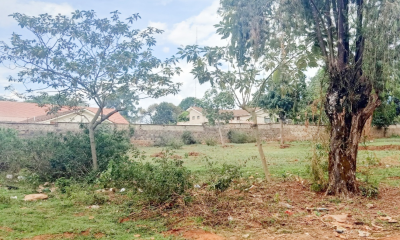News
Uasin Gishu Tops List as EACC Releases Rankings of Kenya’s Most Corrupt Counties
Nakuru, Makueni, Kajiado, Narok, Siaya, Kisumu, Trans Nzoia, Nyeri, Bungoma, Lamu, and Nyandarua topped the list of least corrupt counties

The Ethics and Anti-Corruption Commission (EACC) has unveiled a damning report that exposes the counties where citizens are most likely to encounter demands for bribes when seeking public services, with Uasin Gishu leading a troubling list of corruption hotspots across the country.
The National Ethics and Corruption Survey 2024, released on Tuesday, paints a stark picture of corruption in Kenya’s devolved units, revealing that residents of Uasin Gishu, Baringo, Elgeyo Marakwet, Marsabit, and several other counties face the highest likelihood of being asked for bribes to access basic government services.
According to the comprehensive study, which interviewed 5,960 households across all 47 counties between November and December 2024, Elgeyo Marakwet, Marsabit, and Wajir emerged as the counties with the most pervasive bribery culture.
In these three counties, a staggering 100 percent of respondents who sought services from devolved units reported having to pay bribes.
The financial burden of corruption weighs heaviest on residents of Uasin Gishu, where citizens pay an average of Sh25,873 in bribes—the highest amount recorded in the survey.
Baringo follows with an average of Sh16,156, while Embu residents part with Sh12,878 on average when forced to pay bribes for services.
The survey reveals that corruption has become so entrenched in some counties that paying bribes significantly increases one’s chances of receiving services.
In Kakamega, Baringo, and Meru counties, those who paid bribes were 1.37 times and 1.07 times more likely to receive the services they sought compared to those who refused to pay.
County land survey and housing services emerged as the most corruption-prone public services, followed closely by county inspectorate services and interactions with county executives.
The report highlighted a particularly alarming finding regarding employment opportunities within county governments, where job seekers reportedly pay an average bribe of Sh243,651 to secure positions with county executives.
In contrast, the survey identified a group of counties where citizens face significantly lower risks of corruption.
Nakuru, Makueni, Kajiado, Narok, Siaya, Kisumu, Trans Nzoia, Nyeri, Bungoma, Lamu, and Nyandarua topped the list of least corrupt counties, offering hope that ethical governance is possible within Kenya’s devolved system.
The research uncovered troubling insights into why corruption persists.
Most respondents—43 percent—reported paying bribes simply because they were demanded, while 23.3 percent said it was the only way to access services.
Another 18 percent paid to avoid delays in service delivery.
Perhaps most concerning is the culture of silence surrounding corruption.
The survey found that 92 percent of those who experienced bribery incidents never reported them to any authority, with only 2.8 percent taking the step to formally complain.
This silence perpetuates the cycle of corruption by allowing corrupt officials to operate without consequence.

Integrity Centre in Nairobi which houses the headquarters of the Ethics and Anti-Corruption Commission.
The EACC’s findings extend beyond individual transactions to reveal systemic issues within county governance structures.
County Public Service Boards were specifically flagged as being prone to bribery, while entities like Nanyuki Water and Sewerage Company were cited as examples where corruption in public institutions is particularly evident.
Public confidence in the fight against corruption remains mixed, according to the survey.
While religious organizations enjoyed the highest confidence ratings at 39.7 percent, followed by private broadcasting stations at 38.8 percent, political leaders fared poorly.
Members of County Assembly and Governors recorded confidence levels of just 46.6 percent and 45.1 percent respectively in their commitment to fighting corruption.
The report also revealed widespread dissatisfaction with governance standards, with more than 60 percent of respondents expressing disappointment with integrity, transparency, and accountability in public service delivery at the county level.
These findings come at a critical time as Kenya continues to grapple with the challenges of devolution, which was introduced to bring services closer to citizens and improve accountability.
The survey suggests that while devolution has succeeded in devolving services, it has also, in many cases, devolved corruption to the county level.
The EACC’s comprehensive study, which employed both quantitative and qualitative research methods including Computer Assisted Personal Interviews, represents one of the most thorough examinations of corruption trends in Kenya’s devolved governance system since counties were established over a decade ago.
As Kenya’s counties prepare for the next electoral cycle, these findings provide crucial data for voters, civil society organizations, and development partners working to strengthen governance and accountability at the grassroots level.
The challenge now lies in translating these revelations into concrete actions that can restore public trust and ensure that devolution delivers on its promise of bringing ethical, efficient governance closer to the people.
Kenya Insights allows guest blogging, if you want to be published on Kenya’s most authoritative and accurate blog, have an expose, news TIPS, story angles, human interest stories, drop us an email on [email protected] or via Telegram
-

 Grapevine2 weeks ago
Grapevine2 weeks agoRussian Man’s Secret Sex Recordings Ignite Fury as Questions Mount Over Consent and Easy Pick-Ups in Nairobi
-

 News1 week ago
News1 week agoTHE FIRM IN THE DOCK: How Kaplan and Stratton Became the Most Scrutinised Law Firm in Kenya
-

 Investigations1 week ago
Investigations1 week agoMulti-Million Dollar Fraud: Three Kenyans Face US Extradition in Massive Cybercrime Conspiracy
-

 Economy1 week ago
Economy1 week agoIran Demands Arrest, Prosecution Of Kenya’s Cup of Joe Director Director Over Sh2.6 Billion Tea Fraud
-

 Business1 week ago
Business1 week agoA Farm in Kenya’s Rift Valley Ignites a National Reckoning With Israeli Investment
-

 Africa2 weeks ago
Africa2 weeks agoFBI Investigates Congresswoman Ilhan Omar’s Husband’s Sh3.8 Billion Businesses in Kenya, Somalia and Dubai
-

 Grapevine4 days ago
Grapevine4 days agoA UN Director Based in Nairobi Was Deep in an Intimate Friendship With Epstein — He Even Sent Her a Sex Toy
-

 Politics2 weeks ago
Politics2 weeks agoSifuna, Babu Owino Are Uhuru’s Project, Orengo Is Opportunist, Inconsequential in Kenyan Politics, Miguna Says




























